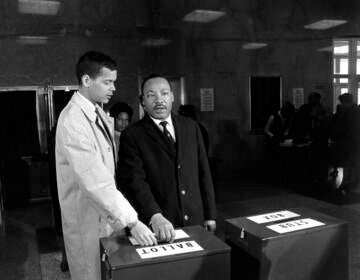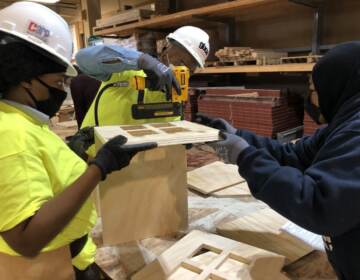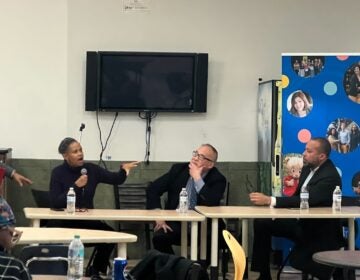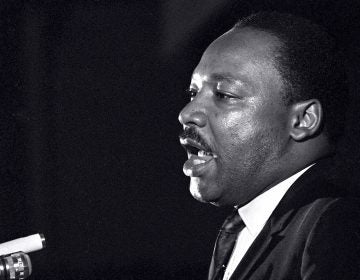Philly civil rights advocates reflect on the continued ‘struggle’ for voting rights in America
WHYY and NewCORE marked MLK Day with a discussion of King’s 1957 "Give Us the Ballot" speech as the struggle for voting rights continues today.
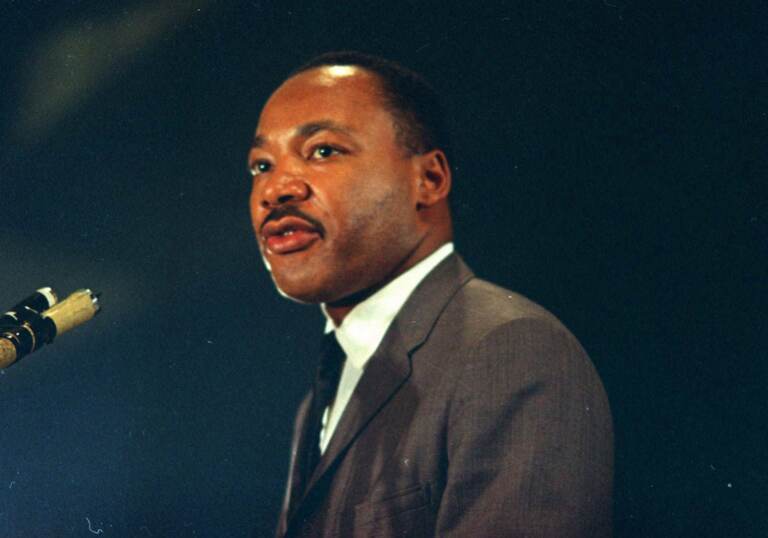
Dr. Martin Luther King Jr. speaks on March 25, 1967. (AP Photo/Chick Harrity)
WHYY and NewCORE on Martin Luther King Day held a virtual panel discussion to reflect on the late civil rights leader’s 1957 “Give Us the Ballot” speech.
The speech, which advocated for voting rights for Black Americans, took place at the Lincoln Memorial in Washington, D.C. at a gathering to mark the third anniversary of the Brown v. Board of Education decision that helped desegregate American public schools.
Sixty-five years after King delivered that speech, legislation that restricts voting rights has been enacted — particularly in Republican-controlled states like Florida, Georgia, and Arizona — and bills aiming to protect and expand voting rights have been blocked in the U.S. Senate.
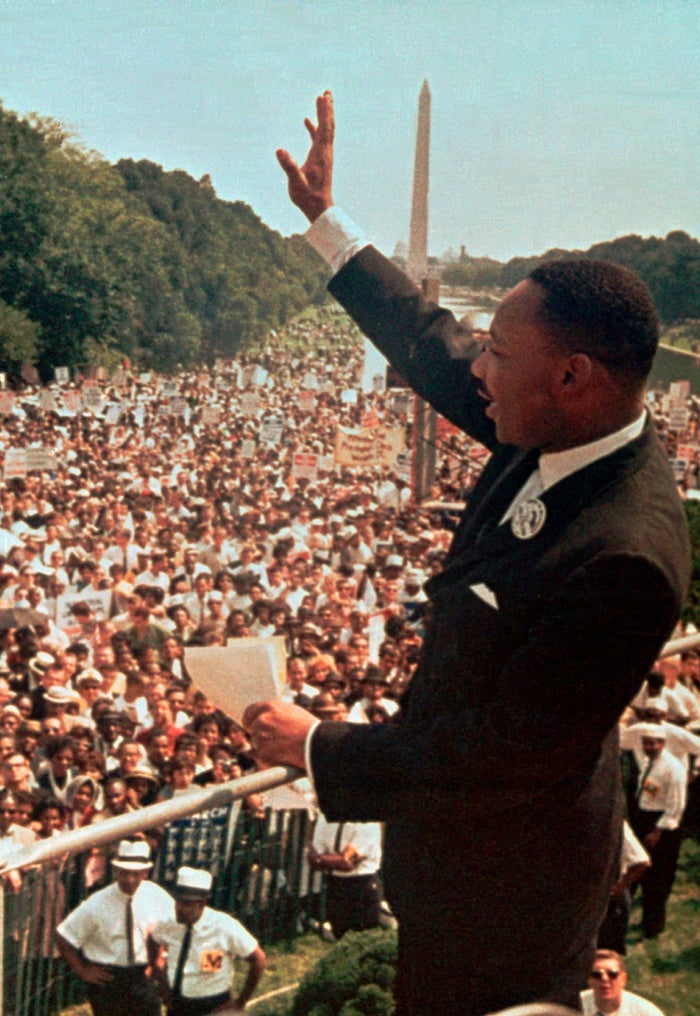
“When we have Republicans around the country who have been introducing legislation to prevent Black people and BIPOC people of color from voting, it’s a struggle,” said panelist Abu Edwards with the Philadelphia-based group Millennials in Action.
“People need to understand the true meaning of voting and the power that Black people possess in this country,” he said. “Dr. King had it right: We can put our own judges on the bench. We can put our own governors in the governor’s mansion. We can put our own senators in Harrisburg or in the state Capitol buildings, but we must understand the importance of our vote.”
Two voting rights bills, the Freedom to Vote Act, and the John Lewis Voting Rights Advancement Act, are set to be debated in the Senate on Tuesday with a possible vote later this week. But as the legislative filibuster remains, the passage of these bills is unlikely amid Republican opposition.
Approval from all democrats is required to change the filibuster rule of a 60-vote threshold. West Virginia Sen. Joe Manchin and Arizona Sen. Kyrsten Sinema have said they will not change the filibuster to ensure the passage of the bills.
Civil rights advocates have gone on hunger strikes and held events across the nation to try to pressure members of Congress to pass the legislation by Martin Luther King Jr. Day.
President Joe Biden and Vice President Kamala Harris on Monday once more urged for the passage of the voting rights legislation. That same day, King’s son Martin Luther King III called on legislators to pass the bills, and criticized Sinema’s position on the 60-vote threshold.
The Freedom to Vote Act would make Election Day as a federal holiday, allow for online and same-day voter registration, approve mail-in voting nationwide, and reinstate voting rights to people convicted of felonies. The John Lewis Voting Rights Advancement Act aims to restore parts of the Voting Rights Act of 1965 that were weakened by the U.S. Supreme Court in 2013, and to help address voter discrimination. A third bill, the Protecting Our Democracy Act, aims to curb potential abuses of executive power.
Panelist Rev. Gregory Holston said he believes ensuring voting rights is fundamental to achieving equality, and encouraged people to call on their legislators to support these bills. He also said the president should take a more proactive role in getting the legislation passed.
“King said in 1964 … when the question was whether he should go to Selma to push for voting rights or … work to pass the War on Poverty, he said, ‘If we don’t get the vote, we can’t even really address poverty,’” Holston said.
“The only way the voting rights bill passed in ‘65 was because we dared to walk the Pettus Bridge and face the dangers there,” he added. “It is all of us who knows this as an issue that needs to begin to stand up on this right now … and demand the people that we got elected in the first place … to demand this president — this president would not have been elected without Black and brown people getting out to vote — demand that this president push with all of his energy, with all the weight of the federal government behind him, and use all of the tactics, hold back Federal Reserve resources from those senators who don’t want to vote for what is fundamental.”
Panelist Saj “Purple” Blackwell, with the Blackwell Cultural Alliance, said it’s important to continue King’s legacy by uplifting the “superheroes” of communities and by encouraging civics at an early age. That involves informing young people about the social issues that affect them, including voting rights restrictions, said Blackwell, who is also a member of WHYY’s News and Information Community Exchange (NICE) Program. She suggested high schools host voter registration parties when their students turn 18.
“We have to bring those boots-on-the-ground together to create this movement, a flash mob, that we need to make change in D.C.,” she said. “We need to begin to prepare our young people for what is coming down the line. We need to let them know that they are part of the solution and then we need you to flash mob for this solution.”
Panelist Brittany Smalls with the group One PA said for change to occur, there needs to be camaraderie among the people. She said Biden made promises during the election that have not yet been fulfilled, and believes more could be accomplished if more people came together to advocate for what they want.
“I think that when we’re thinking about moving forward and with the changes that we want to see in this government, we really have to have the mindset of how we can stick together and put our differences aside,” she said. “I think sometimes … we may not see the whole scope of the picture in the same way. But when we see something that’s very detrimental and critical to what’s happening in our society, we have to stay together and being together to stop this.”

Saturdays just got more interesting.
WHYY is your source for fact-based, in-depth journalism and information. As a nonprofit organization, we rely on financial support from readers like you. Please give today.



